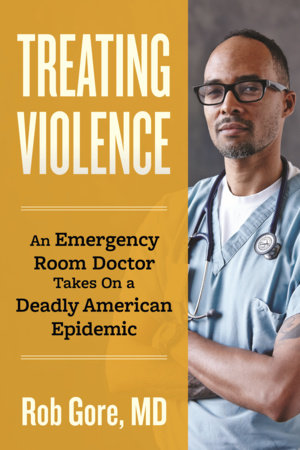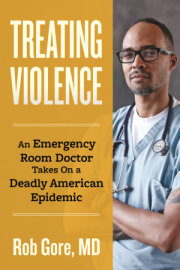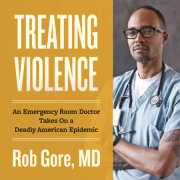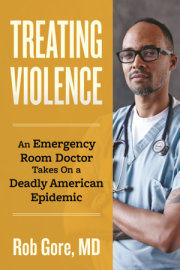“[A] fast-paced title . . . A vibrant and educational consideration of a devastating urban and global public problem by a CNN Hero.”
—Booklist, Starred Review
“A frank, powerful argument for public health initiatives addressing violence.”
—Kirkus Reviews
“‘The mission begins with the recognition that violence is a public health problem,’ writes physician Rob Gore in his at times harrowing, but always inspiring, book Treating Violence. Gore argues that the violence plaguing impoverished urban communities—where the residents tend to be Black or Brown—can be managed, like a disease, with thoughtful intervention. Dr. Gore has dedicated much of his life to that task, and his powerful story is its own kind of intervention in that it offers readers hope for a safer, more caring world.”
—Theresa Brown, RN, author of The Shift and Healing
“Urgent and timely. Rob Gore shines a light on what is arguably the most pressing public health issue of our generation. He helps us understand solutions in our communities, without letting our institutions off the hook. A much-needed book for this moment.”
—Danielle Ofri, MD, PhD, author of When We Do Harm: A Doctor Confronts Medical Error
“As a survivor of childhood trauma, I know firsthand the impact of violence on children. This book is critical to understanding the dynamics of trauma and violence that plague our youth. Dr. Gore’s unrelenting tenacity at attacking this epidemic using data and advocacy, and his daily work on the front lines, combine for a much-needed solution. Our children deserve a life filled with access, opportunity, and belief that empowers them to reach for the stars on their Mission Possible.”
—Leland Melvin, astronaut, author of Chasing Space: An Astronaut’s Story of Grit, Grace, and Second Chances
“In this masterful work, Dr. Rob Gore pulls the reader into his world and work while offering rare insight into the ways that violence shows up across life’s journey. Treating Violence is beautifully written, intellectually striking, and as thoughtful as it is informative. From the streets of major cities across the United States to the emergency room and beyond, we bear witness to pain, prevention, and possibility in our collective experience(s) with violence in its different forms.”
—Christopher Emdin, author of Ratchetdemic and For White Folks Who Teach in the Hood . . . and the Rest of Y’all Too
“This book is a moving testament to the enduring power of compassion and the profound impact one person can have on the lives of many. Dr. Rob Gore’s story is an inspiring call to action, a reminder that in the face of adversity and violence, there is always hope and there is always a way to make a positive difference. Treating Violence is a must-read for anyone seeking to understand the true essence of healing, transformation, and the indomitable strength of the human spirit that can exist throughout our nation’s emergency departments.”
—Dr. Nadia Lopez, author of The Bridge to Brilliance: How One Principal in a Tough Community Is Inspiring the World
“Few community changemakers use as direct an approach to interrupting violence for our youth as Dr. Rob Gore. His deep commitment to healing trauma and addressing social and environmental causes of community decay has literally and figuratively saved many lives, in plain sight. Many, from the affected youth to our elected leaders, can follow Dr. Gore’s lead on ensuring a more equity and positive future for all.”
—Sean Rice, principal, High School for Public Service
“As we address the critical issue of violence in our communities, Dr. Rob Gore’s new book amplifies the need to treat violence as a public health issue while providing tactical and transformative practices that can be implemented across the country. This text should be a part of any city or community focused on truly addressing violence with proven interventions and solutions.”
—Christina Grant, EdD, superintendent of schools, Washington, DC
“Treating Violence is a deeply personal and wildly eye-opening recollection of daily violence unleashed onto Black bodies through the decades from an author who teetered on both sides of being a person subjugated to these acts and a healer both in the emergency department (ED) and global communities. More than a memoir, this book is a reminder that these traumatizing experiences aren’t unique. The commonality of these events is a testament to an amalgamation of larger societal issues that BIPOC communities have to constantly grapple with.”
—Hank Willis Thomas, conceptual artist, author, and US Department of State Medal of Arts recipient
“Gun violence is one of the most, if not the most, preventable public health epidemics in our country. As an emergency room physician, Dr. Gore has helped save countless individual victims and has decided to take it a step further to help save communities. He advances public health initiatives that get to the root of gun violence prevention. His dedication, advocacy, and experience are an inspiration to anyone interested in truly addressing the uniquely American gun violence crisis.”
—Jumaane D. Williams, Public Advocate of the City of New York
“Filled with compelling stories that highlight the horrific epidemic of violence in the US, this book also provides solutions, and not just band-aids for the symptoms but real solutions that deal with the root causes of trauma linked to systemic racism. The book is a wake-up call for all Americans to open our hearts to stop the cycle of violence by allowing people to heal and by stopping the cycle of racism that is rooted so deeply in our nation.”
—Jean Oelwang, CEO of Virgin Unite and author of Partnering
“Dr. Rob Gore, a distinguished alumnus of the Jacobs School of Medicine and Biomedical Sciences at the University at Buffalo and an experienced emergency room physician, delves into the somber reality of violence within American society. This gripping book takes readers on a thought-provoking journey, examining violence through the lens of public health while uncovering the harrowing stories of victims and survivors. With its compelling narrative and expert analysis, it is a must-read for anyone seeking to understand and confront the deadly American epidemic of violence.”
—Allison Brashear, vice president of Health Sciences and dean of the Jacobs School of Medicine and Biomedical Sciences, University at Buffalo
“In Treating Violence, Dr. Gore pulls us into his extraordinary personal journey as a young Black doctor in Brooklyn who vows to stop the trauma of violence before witnessing another person from his community fighting for their life in an emergency room. From Morehouse Man to National Hero, Gore has a vision for healing that is revolutionary and includes work necessary far beyond the field of medicine. Gore’s sincere love for the people he treats is a healing balm inside these pages and a deliberate call to action that could forever change the way we see and treat violence at its roots.”
—jessica Care moore, author of We Want Our Bodies Back
“Dr. Gore has been a longtime leader in creating coalitions to stop violence before it starts. This book tells the story of how—and why—while centering the work in the human stories. Read it to be inspired and to have hope.”
—Megan Ranney, MD, MPH, dean, Yale School of Public Health






